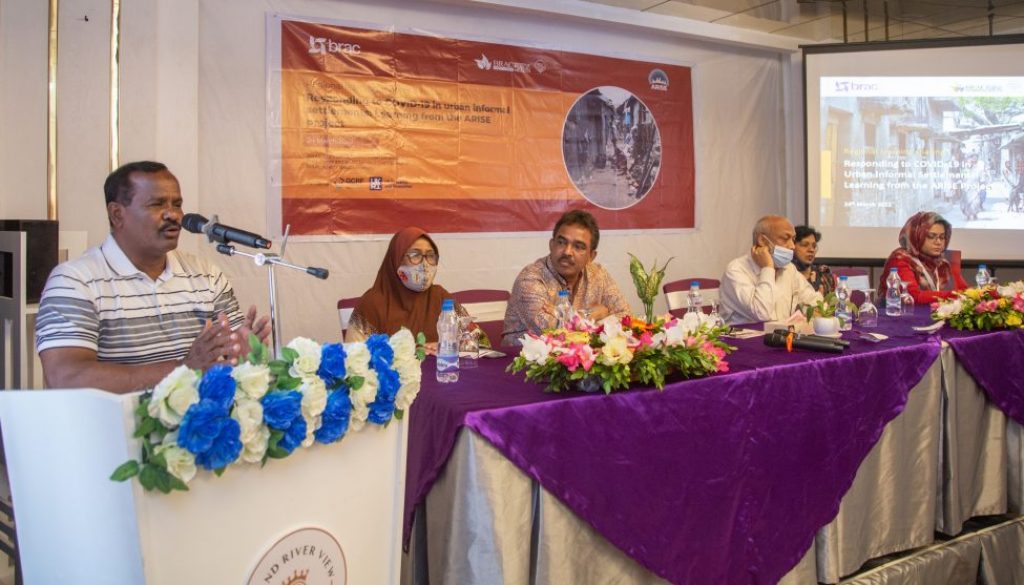Facilitating Dialogue between Informal Settlement Residents and Governance Actors
By Sabrina Fatema Chowdhury, Research Associate, BRAC JPGSPH
“It is not possible for any one type of organisation to support us [residents of informal settlements]. The government and private organisations need to work together.”
Tanvir Islam, a community member and a co-researcher, shared his thoughts during the regional learning-sharing workshops under the ARISE Responsive Fund sub-project held in Dhaka in March 2022.
Three Regional Learning Sharing events were held in Khulna, Rajshahi and Dhaka in March 2022 to share the learnings from ARISE Responsive Fund project and the experience of informal urban settlements residents. The event aimed to create a platform for informal urban settlement dwellers to share their health and wellbeing challenges with the duty bearers and governance actors, like senior City Corporation officials (i.e., Chief Executive Officer (CEO), Chief Health Officer (CHO)), elected local government representatives (Ward Councillors), and NGO representatives (key service providers).
Participants discussed possible solutions and called for support from all stakeholders to address the health and wellbeing needs of informal settlement dwellers. They also talked about improving accountability mechanisms for service providers, governance actors, and community members.
Two key messages came out from the discussion:
- Both community members and governance actors need support from the private sector (i.e., NGOs and research organisations) to reduce gaps in services.
- NGOs and research organisations can create a bridge between the community and the duty bearers by facilitating dialogues to raise and amplify the voices of the marginalised.
Governance actors and the private sector need to work together
Residents living in informal urban settlements often have low access to even the most basic healthcare services. Following a drop in COVID cases in Bangladesh and many members of their communities falling into the ‘new poor’ category, workshop participants emphasised the need for collaborative interventions by City Corporations and NGOs to address their health needs and provide livelihood support. Specifically, community participants asked for the provision of maternity care for pregnant women and day-care centres for working mothers within or near their settlements. They also raised concerns regarding the increasing risk of adolescent boys and young men being involved in substance abuse due to school/college closure and job loss during COVID-19. They suggested that youth training programmes can assist in reducing this.
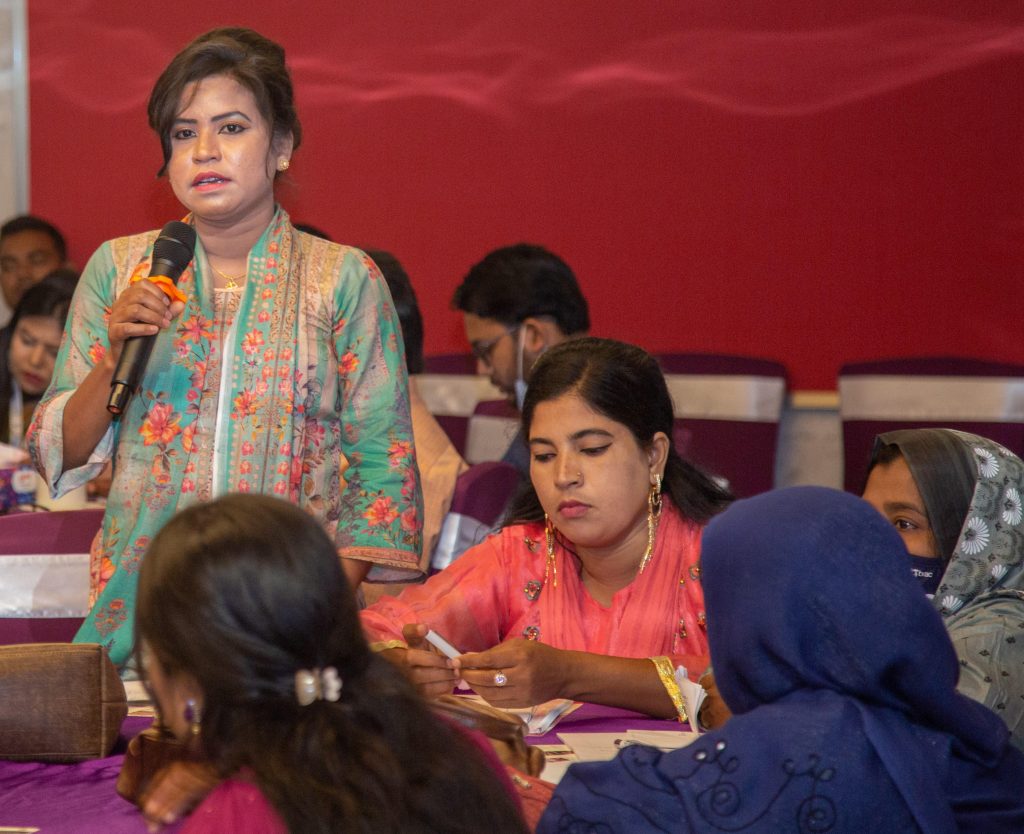
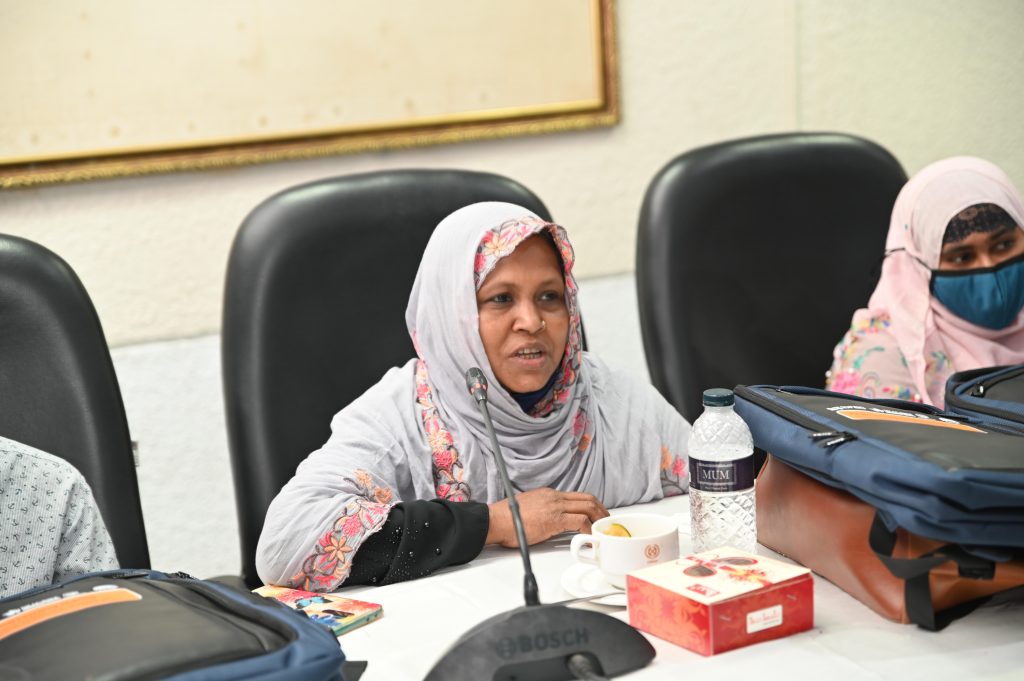
During COVID-19, the ARISE Responsive Fund supported residents of informal settlements in Dhaka, Khulna, and Rajshahi in meeting their urgent health and hygiene needs. Community members shared their positive experiences with the support provided by ARISE. However, they also raised concern about the negative effect on their communities when an intervention/project ends. To ensure that interventions are successful and to sustain the project’s positive impact over a longer period, participants stressed again the need for city corporations and NGOs to work collaboratively.
While governance actors acknowledged the positive impact of many interventions in informal urban settlements, including the support provided by the ARISE Responsive Fund, they stressed the importance of consulting with city corporation authorities during the planning phase, so that they can guide projects to areas where the extremely poor and the deprived live.
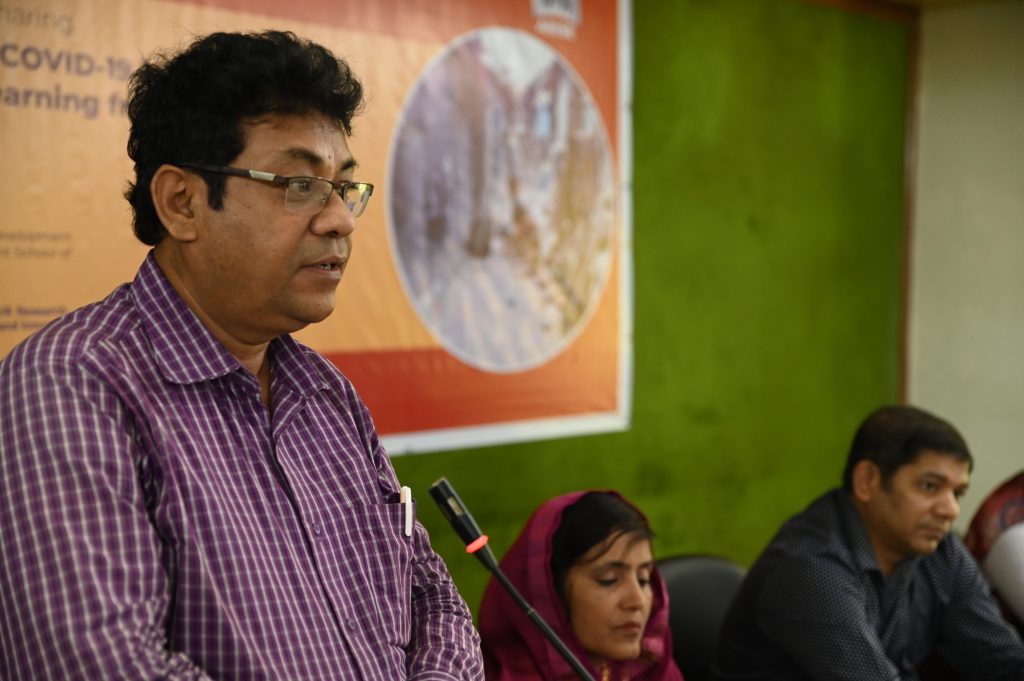
Right: The Chief Health Officer (CHO) of Khulna City Corporation
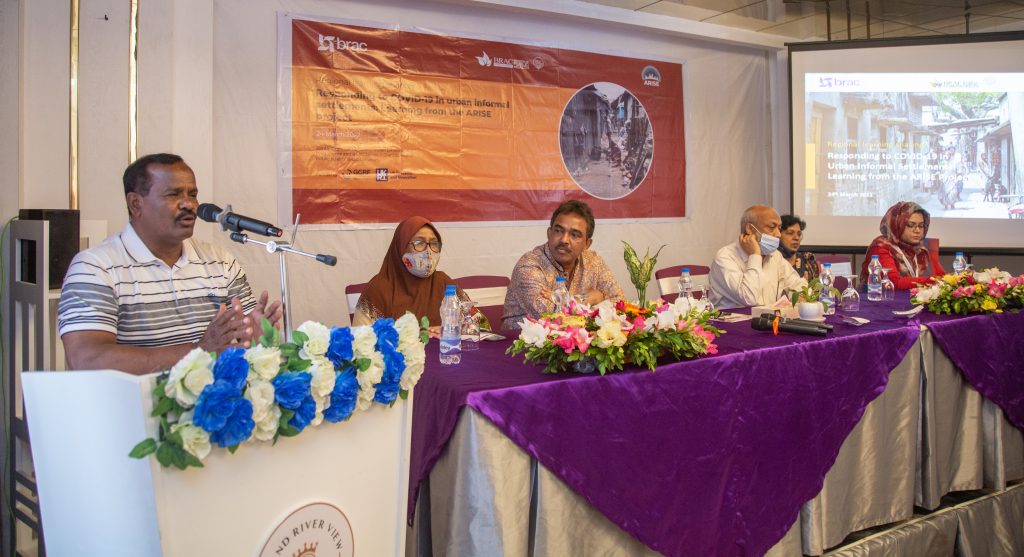
Right: The Chief Health Officer (CHO) of Khulna City Corporation
Some community participants complained of misconduct during the distribution of aid and relief materials, which excluded many marginalised people in need of assistance. According to them, the absence of accountability and lack of an updated list of marginalised populations contributed to this misconduct. Acknowledging the problem, Dr. A. B. M. Sharif Uddin (CEO, Rajshahi City Corporation) also emphasised the urgent need to develop a system to prepare a list of city residents, including their incomes, occupations, and the number of family members. He suggested that a census in the city corporation area could be a solution to make the list, ensure those who need help can get it, and to increase transparency. He requested logistical, technical and workforce support from the private sector and NGOs to help them in improving accountability mechanisms.
Additionally, participants felt that both the government and private sector could benefit from the existing good working relationships between NGOs and city corporations in many regions. NGOs could reach out to communities where the presence of the city corporation is limited and inform the city corporation about their needs of necessary services. Additionally, a bottom-up approach could establish a sense of ownership and responsibility among all relevant stakeholders and ensure their participation, according to Md. Imamul Azam Shahi (Programme Head, BRAC Urban Development Programme (UDP)).
More dialogues to improve accountability and accelerate ensuring services
Residents of informal urban settlements rarely get the chance to directly discuss their challenges in accessing services. Although the learning-sharing events were a new experience for many of the community participants, they appreciated the opportunity to speak with senior officials from city corporations and elected government representatives in person about the challenges they face in getting services related to health and income and presenting their priorities.
Governance actors also appreciated the structure of the event as they got the chance to listen to community members and their needs. They acknowledged that there are many gaps from their side, and often, they cannot visit the settlements themselves. They were also able to share areas where they needed support from NGOs to increase accountability and build-up a partnership to make services available and more accessible.
The discussions in the learning-sharing events manifest that more NGOs and research organizations should come forward and act as the medium of communication between governance actors and marginalised people living in informal settlements. If all parties can have direct conversations at a forum, policymakers, policy implementers, and service providers can better understand the needs of community, which can lead to more quickly solving some of the issues faced by marginalised communities.
The workshop titled ‘Regional learning sharing: Responding to COVID-19 in Urban Informal Settlements: Learning from the ARISE Project’ was held on 20th, 24th, and 31st March 2022 in three city corporations in Bangladesh; Khulna, Rajshahi, and Dhaka, respectively. The workshops were jointly organised by the ARISE Hub Bangladesh, BRAC James P Grant School of Public Health (JPGSPH), and BRAC Urban Development Programme (UDP) under the ARISE Responsive Fund.
